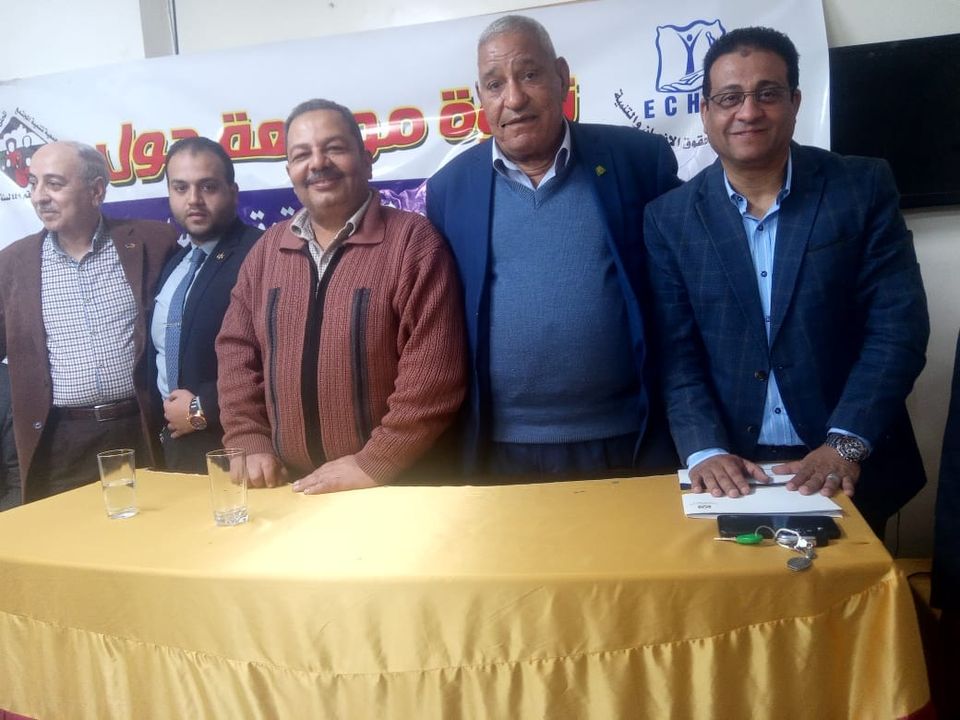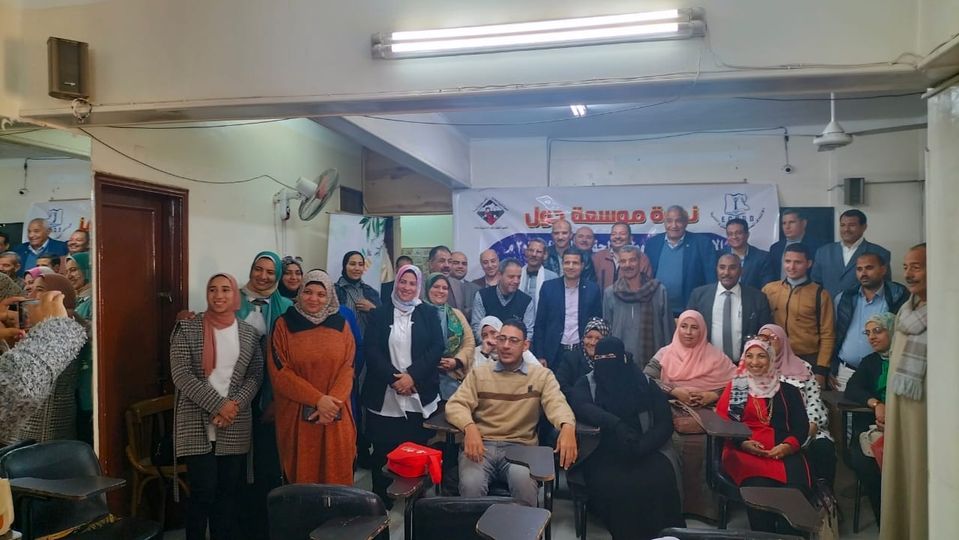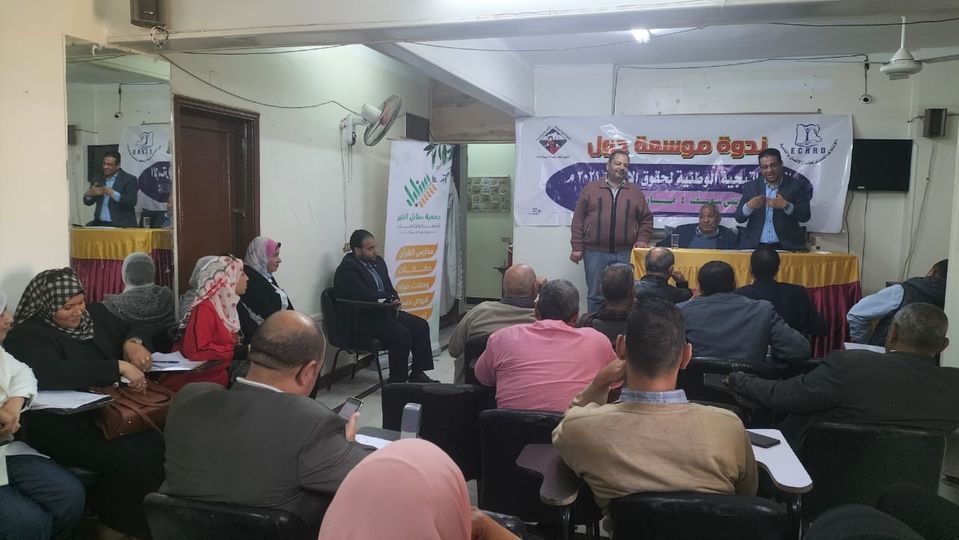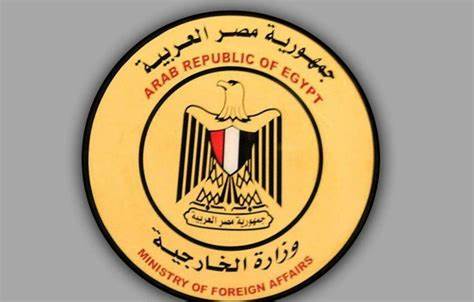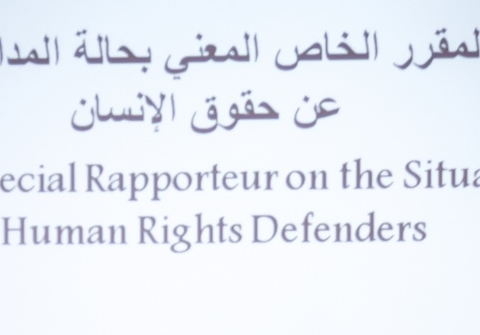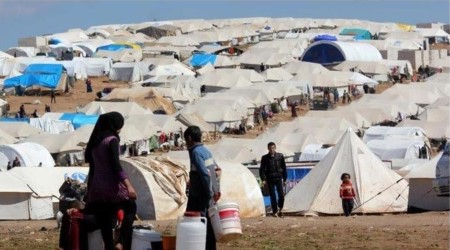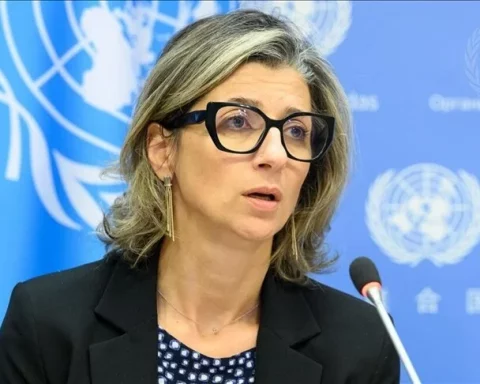Press Release
………………………………………………………….
Within the framework of the ECHRD initiative, a seminar was held on Saturday, 4-3-2023, at the headquarters of Sanabel Al-Khair Association in Beni Suef City, for 72 civil and developmental associations in Beni Suef Governorate in the presence of Mr. Sayed Mahran (President of the Productive Families Association), Mr. Refaat (President of the Consumer Protection Association and a member of the General Federation of Associations), Mohamed Sayed Abdel Qader (President of Shabab Elkheir Association), Emad Essa (coordinator of ECHRD in Beni Suef Governorate), and Ms. Abeer Mohamed (Forum for Development and Human Rights Dialogue) in Cairo.
Professor Emad Essa said at the seminar that: “Egyptian President Abdel Fattah El-Sisi launched, on Saturday, September 11, 2021, the first national strategy for human rights, which is the most accurate expression of the new Egyptian Republic’s view of the future of Egyptian human rights, which has been recrystallized within a number of main axes, Which are fully compatible with the general path of the Egyptian state at this stage, and with the aspirations that our beloved Egypt aims to achieve by 2030, by targeting the promotion of social, economic, political and cultural rights within the country,
The launch of the National Human Rights Strategy affirms President El-Sisi’s belief in freedoms and democracy and working to promote them in various ways, while ensuring the security and safety of society and protecting it from malicious and extremist ideas. However, in order to ensure the realization of all the rights included in the strategy, society must be prepared for a set of laws and legislation that stimulate comprehensive development and the values and principles of human rights, by emphasizing the positive relationship between the rule of law and comprehensive sustainability, especially since the rule of law and development are closely linked as they reinforce each other. If the law prevails, the level of sustainability increases in a way that allows justice to reach everyone to ensure economic, social, cultural, and other human rights.
Emad Essa noted that the integration of the National Strategy for Human Rights, for the first time, into the economic and social development plan reflects the conscious national tendency to link development projects and programs with the goals of promoting and protecting human rights, stressing that the efforts to implement the strategy were characterized by an integrated nature on tracks: Legislative development, institutional development, education and capacity-building, stressing that it aims to promote civil, political, economic, social and cultural human rights, in addition to promoting the rights of women, children, people with disabilities, youth and the elderly, within the framework of commitment to the constitution, national legislation and international and regional agreements to which Egypt is a party.
Egypt has progressed steadily on the path of construction and development to provide a decent life for its people, in order to enhance the national action process that aims to build the Egyptian person and develop his capabilities, improve human development indicators, and promote and protect human rights, thus advancing the state’s march in development and modernization to build the new republic.
The President’s initiatives and decisions represented the driving force towards societal change and the promotion and protection of human rights at various levels. He also noted the involvement of the concerned authorities, including the parliament and specialized national councils, in an integrated national work system to implement the strategy, which was reinforced by constant consultation between the technical secretariat of the Supreme Standing Committee for Human Rights with civil society organizations on best practices for implementing the strategy on the ground.
Emad Essa stressed the importance of having a civil society, which assists the government in implementing and pursuing the strategy’s axes, especially as it constitutes the third side alongside the state and the private sector in the process of economic and social development. It should be entrusted with participating in the implementation of a number of the National Human Rights Strategy’s targeted outcomes. This is done through three maim roles: follow-up and monitoring, evaluation of implementation, contribution to implementation by proposing draft laws, and education and capacity building.
In his lecture, Mohamed Sayed Abdel Qader confirmed that the strategy was based on three pillars:
• Constitutional guarantees for the protection, promotion and respect of human rights.
• Egypt’s international and regional human rights obligations.
• The 2030 Sustainable Development Strategy.
The strategy was based on fundamental human rights principles, the most important of which are: Human rights are rooted in human dignity, non-discrimination, promotion of democracy, promotion of good governance, values of integrity, transparency and the right to development.
The strategy addressed four main challenges to the promotion and protection of human rights:
- The need to promote a culture of human rights.
- The need to enhance participation in public affairs.
- Difficulties in achieving targeted economic development.
- Terrorism and regional unrest.
The strategy included three paths for achieving the targeted results. The first track is legislative development. The second track is institutional development and the third track is human rights education and capacity-building.
- * * * In order to achieve the vision of the strategy, four main themes were: first, civil and political rights, second, economic and social rights, third, the rights of women, children, youth, persons with disabilities, youth and the elderly, and fourth, human rights education and capacity-building.
Each pillar contained its own points of opportunity, challenges and targeted results. There are still talks to be had to achieve the comprehensive concept of human rights that came in the vision of the National Strategy for Human Rights.
The implementation of the strategy witnessed a founding effort by the Technical Secretariat of the Supreme Standing Committee for Human Rights and the national authorities, each in its field. There is a great performance by state agencies, which in the past lacked an inclusive framework for monitoring and codifying.
He explained that the advancement of human rights is a systematic policy of the Egyptian state supported by the various authorities and at the highest level, within the framework of a comprehensive national vision based on the constitution, the law and Egypt’s relevant international and regional obligations, in a way that meets the aspirations of the Egyptian people and contributes to the consolidation of the new republic based on the rule of law, citizenship, equality and equal opportunities.
He pointed to the Egyptian state’s keenness to implement its obligations in the field of promoting and protecting human rights, and to ensure reducing the burdens on the Egyptian citizen despite the local and global difficulties, resulting from the repercussions of the outbreak of the “Covid-19” and the outbreak of the Russian-Ukrainian crisis, especially at the level of supply chains for some strategic commodities.
He stressed that the experience of implementing the strategy confirms that the close interdependence between efforts to promote and protect human rights and the “Sustainable Development Strategy: Egypt’s Vision 2030” is a basic guarantee for their success together. This is in light of the state’s commitment to achieving comprehensive development, as it is a right of the Egyptian people, and a patriotic duty to achieve well-being for all citizens, and to ensure their active and free participation in national efforts, along with their fair enjoyment of development revenues.
He also addressed the President’s initiatives and decisions and their impact on the momentum towards societal change and the promotion and protection of human rights, among them is canceling the extension of the declaration of a state of emergency, calling for the launch of a comprehensive national political dialogue, reactivating the Presidential Pardon Committee, declaring 2022 as the year of civil society, pushing for women to assume judicial positions in the State Council and the Public Prosecution for the first time, in addition to supporting public freedoms, especially freedom of expression, and political and societal participation, as one of the elements of democratic practice.
He noted the impact of the Presidential initiatives in promoting economic and social rights, and the rights of women, children, people with disabilities, youth and the elderly, including the national project for the development of the Egyptian countryside (Hayah Karima), which, through its first phase, promoted human rights at various levels, particularly in the areas of health, education, adequate housing, clean drinking water and safe sanitation networks, along with its contribution to the dissemination of the culture of human rights.
The lecturer presented the great achievements of the (Hayah Karima) initiative, including the Ministry of Communications and Information Technology’s provision of telecommunications and Internet infrastructure, fiber optic connection to more than 3.5 million homes, and the construction of more than 1,000 new towers for mobile phone networks in the targeted villages.
He referred to the efforts of the Technical Secretariat of the Supreme Standing Committee for Human Rights on the legislative track, in particular its submission, after extensive consultation with civil society organizations and various societal forces, of more than 30 law proposals on various legislative issues related to human rights, noting that Parliament had approved two of these proposals, with the full support of the Ministry of Justice.
The lecturer explained that the Technical Secretariat had implemented the project “Experiences in Development”, which aims to monitor, document, and draw lessons learned from realistic experiences based on convergence among all citizens of the country and the desire to participate in life opportunities, face challenges, and chart a better life, without exclusion.
He confirmed that several ministries have established or developed units or departments specialized in human rights, in addition to integrating the Ministry of Justice, the Administrative Control Authority, the Central Agency for Organization and Administration, the National Institute for Governance and Sustainable Development, and the National Strategy for Human Rights in their training programs designed for state employees in various sectors.
He presented the national efforts made to achieve the strategy’s objectives in its four axes, notably civil and political rights. The lecturer indicated that the right to life and physical integrity has been strengthened by providing the protection of occupants of social welfare homes, orphanages, nursing homes, psychiatric and addiction treatment clinics, in addition to the issuance of the executive regulations of the law regulating clinical medical research. It also launched several initiatives to confront cases of suicide.
Mohamed Sayed confirmed that the authorities entrusted with implementing the National Strategy for Human Rights have taken serious steps, including the abolition of the law to extend the state of emergency, as well as the continuation of the main committee for legalizing the conditions of churches and their buildings to adjust the conditions of churches, which reached more than 2,401 churches and service buildings affiliated with them until April 2022. This is in addition to activating the presidential pardon committee and releasing a large number of pretrial detainees.
Ms. Abeer Mohamed from the Forum for Development and Human Rights Dialogue confirmed that:
National efforts to implement the National Human Rights Strategy 2021-2026 are outstanding, and together we note the role of the President’s initiatives and decisions in the momentum for social change, promotion and protection of human rights at various levels, and involvement of the concerned authorities, including parliament and specialized national councils, in a national integrated work system for implementing the strategy, strengthened by the permanent consultation between Technical Secretariat of the Supreme Standing Committee for Human Rights and civil society organizations on best practices for the implementation of the Strategy on the ground.
The Egyptian State has affirmed its seriousness in implementing the National Human Rights Strategy, based on its self-conviction and comprehensive development approach. The government has put the strategy into practice and its integration into the state’s public policies as its two focal points in government action. The Prime Minister, Dr. Mustafa Madbouly, chaired several meetings to review implementation progress and direct various ministries and agencies to cooperate with the Technical Secretariat of the Supreme Standing Committee for Human Rights and provide all relevant data to enable the follow up and monitoring of the implementation.
The House of Representatives and the Senate are keen to exercise their oversight role, monitor the implementation of the Strategy, hold hearings, and use their parliamentary tools to follow up on its implementation with ministries and stakeholders, as well as with the Technical Secretariat.
The process of implementing the strategy in all its axes was closely monitored and directed by the Minister of Foreign Affairs, and the Chairman of the Permanent Higher Committee for Human Rights, Mr. Sameh Shoukry, provided support for the work of the Technical Secretariat.
Ashraf Diab (Forum for Development and Human Rights Dialogue) said that the national strategy represents a major step forward, as it includes a program and a specific action plan over a period of 5 years, from 2021 to 2026.
The Egyptian strategy includes 4 main axes, which are civil and political rights, economic, social and cultural rights, the rights of women, children, people with disabilities, youth and the elderly, and human rights education and capacity building. It is in each of these axes that there is an action plan, some of which include some executive measures, and the other proposes new legislative amendments in order to comply with this strategy.
Civil society is an essential partner in the development process. There are more than 50,000 civil society associations working in various fields, including development and human rights.
The launch of the strategy in the presence of a constellation of civil society, parties, parliament and the government highlights the idea of participation and the societal dialogues that took place. This strategy, in its preparation, made sure to obtain all opinions, whether civil society or stakeholders. This indicates that the dialogue between the state and civil society to improve human rights conditions can produce significant effects, on top of which is this strategy
